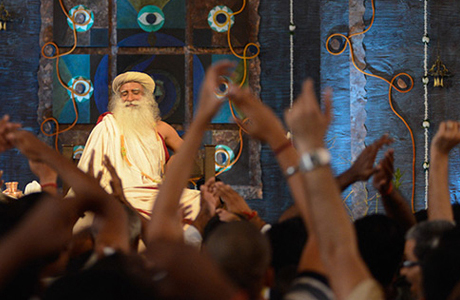Begging – A Tool for Growth

“A spiritual person, however, takes to begging because he wants to drop himself. The idea, ‘I earn my own living, my own money, my own food, my own home,’ is a big part of your ego.”
—Sadhguru
What is the significance of begging in the Indian spiritual tradition? Sadhguru tells the story of one wise beggar to illustrate.
What is the significance of begging in the Indian spiritual tradition? Sadhguru tells the story of one wise beggar as well as an incident from the life of Gautama the Buddha to illustrate. In earning a living, Sadhguru says, one gathers himself, but consciously begging has been used as a tool to drop oneself.
Sadhguru: Once, there was a beggar who begged for everything. All his life, he lived in one tattered coat that he wore. Gradually, he gathered a certain reputation and people started going to him for all kinds of solutions. He became known as a very wise man. News reached the king who also started going to him seeking advice.
One day, the king said, “You should not be a beggar, you should become my minister.” The beggar replied, “What you are offering does not mean anything to me, but if it makes me useful to the people, I will take this offer under one condition: I must have one room in the palace which nobody should enter or inspect, including yourself. If anybody enters or inspects this room, I will no longer be your minister.” The king said, “Yes I will give you a room. Keep it any way you want. Why would I want to look into your room?”
This went on for a few years and the beggar, who was now the Chief Minister, could not go around in his beggar’s coat anymore, so he dressed himself properly. With time, he came to be immensely admired and became very dear to both the king and the people. Seeing his popularity and his unrivaled wisdom, the other ministers were very jealous. Some of the ministers began thinking, “He has got something suspicious in that room. That is why he does not want anybody to enter. It must be some plot he has against the king and the nation. Otherwise, why is he protecting it like that?”
The rumor built up, and it soon reached the king’s ears. The king got fired up and one day told the minister, “I want to see what is in the room.” The minister said, “You can see, but the moment you enter that room, I will go back and no longer be a minister.” The king, knowing the man’s wisdom, did not want to lose him, and so, restrained himself.
However, after some time the king became restless and people were telling him stories, “You are the king and no secrets must be hidden from you in your palace.” This went on until one day, the king insisted, “I must see that room.” The minister agreed, so the king went in. He saw nothing in the room. It was just a plain, empty room. Hanging on the wall was that old tattered coat the beggar used to wear.
The king looked at all this and asked, “Why did you keep this a secret? There is nothing here.” The minister answered, “During the day, I am a minister. At night, I wear that coat and sleep on the floor. This way I never get caught up with my position as a minister. But now that you broke the agreement, it is off.” He wore his coat and walked away.
Begging Consciously
Begging in India was a part of the spiritual tradition. You did not select your food; you begged and ate whatever people gave you. It was considered a great privilege when a person on the spiritual path stood in front of your house and asked for food, and for you to offer food to him. Today, these traditions have been misused, and there are so many people wearing the uniform of a spiritual seeker who are just plain beggars in search of money and food. But when people begged consciously, it had a completely different meaning and possibility.
When someone stretches his hand in front of you, if you feel it is being misused, you can refuse and move along. If you feel that it is really coming out of genuine need, you must respond as a human being. Just think how difficult it would be for you to stretch your hand in front of someone on the street. That man is putting himself through that.
A beggar may be doing so out of helplessness, but a sanyasi is doing it consciously for his own growth, so that he does not get too full of himself. A beggar does not have such great goals. He is just trying to fill his belly which he has become incapable of doing by himself.
Disability is not just in terms of losing a hand or a leg. You can become disabled just in the way you think and feel about life. Actually, almost the whole population is in some way handicapped because of their patterns of thinking and feeling towards life. Similarly, the beggar has gotten himself into a corner, and he thinks that begging is the easiest way to earn a living.
Dropping Yourself
A spiritual person, however, takes to begging because he wants to drop himself. The idea, “I earn my own living, my own money, my own food, my own home,” is a big part of your ego. One day, a guest came to Gautama the Buddha carrying a few flowers. It is a part of our culture that when people go to meet a guru, they take flowers as an offering.
When the man came, Gautama looked at him and said, “Drop it.” The man looked around and wondered, “What to drop?” He thought it was the flowers. He hesitated, “But I brought it for you.” Gautama again said, “Drop it.” So the man dropped the flowers. Gautama looked at him and again said, “Drop it.” The man said, “I have dropped the flowers. I brought them as a gift, but you asked me to drop them so I did. What else to drop?” Gautama said, “No, you drop yourself first. The flowers are not the problem. You plucked the flowers for me. That is fine, I will take them, but you drop yourself.”
Begging was used as a tool to drop yourself because in earning a living, you gather yourself. But you drop yourself in just stretching your hand in front of someone, knowing and being fully conscious that you have the capability to earn your living, yet you still choose to beg. That is a tremendous shift in a human being. People may give you food or they might just ask you to get out. It does not matter, but being a beggar is not a small thing.
Editor’s Note: Find more of Sadhguru’s insights in the book “Of Mystics and Mistakes.” Download the preview chapter or purchase the ebook at Isha Downloads.
A version of this article was originally published in Mathrubhumi.


